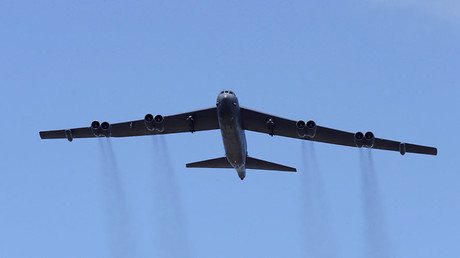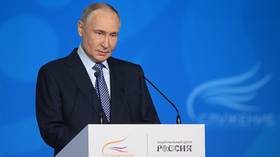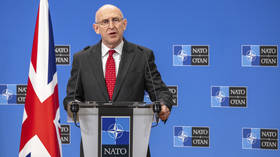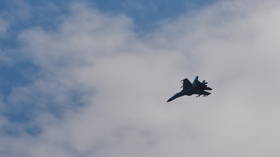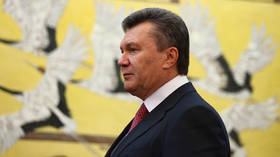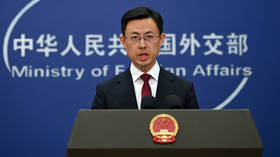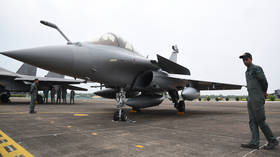US-led coalition ‘acts secretively in Syria,’ Americans often absent from hotline – Russian military

After senior US Air Force officers accused Russian jets of flying dangerously close in Syria, Russia’s Defense Ministry hit back. Moscow said US colleagues only reluctantly share plans for combat aircraft operations, and are acting secretively in Syria.
According to the US Air Force, Russian planes allegedly don’t ‘squawk’ (carry transponders that send a four-digit number allowing air-traffic controllers to identify them), and fail to timely answer ‘guard calls,’ which are urgent summons on an emergency radio frequency.
“Rarely, if ever, do they respond verbally,” Brig. Gen. Charles Corcoran, commander of the 380th Air Expeditionary Wing, who flies combat missions in a stealth fighter, told the Wall Street Journal on Monday.
“Rarely, if ever, do they move,” he complained. “We get out of the way. We don’t know what they can see or not see, and we don’t want them running into one of us,” Gen. Corcoran added.
The Russian Defense Ministry noted in a statement on Wednesday that it’s hard to say if the allegations are Gen. Corcoran’s personal views or if they are just part of “the farewell Russophobic performance by the outgoing US administration.”
“In any case, we have received no such claims either from Gen. Corcoran or Pentagon representatives during the regular videoconferences with the Russian Defense Ministry on compliance with the memorandum on the prevention of incidents in the Syrian sky,” Defense Ministry spokesperson Gen. Igor Konashenkov stated on Wednesday.
Both the US Air Force and the US-led international coalition are trying to act "secretively" during operations in Syria, he added. “Our American colleagues don’t like to notify [us] about their plans to use combat aircraft, only occasionally indicating the time period and an approximate area. But not the specific types of aircraft and their affiliation.
“This has allowed [the US] in the case of tragic ‘mistakes’ of the coalition aircraft to avoid responsibility for the deaths of civilians and destruction of civilian objects. Suffice to recall the bombing of Kurdish villages in Hasadjek, which led to the deaths of civilians in October 2016.”
Konashenkov said that over 20 civilians were also killed in a B-52 strike carried out by the US on the Idlib province in Syria on January 3 this year.
The mutual flight safety memorandum, agreed by the US and Russia in October 2015, regulates the flight paths and contacts of the countries’ air forces in Syria during an emergency situation. The two countries also set up a hotline for their militaries to discuss the approximate locations and missions of planes in an attempt to avoid operating in the same airspace at the same time.
“We continue to assess that the Russians have no intent to harm coalition forces in the air or on the ground,” US Air Force Col. Daniel Manning told the newspaper. “Because we believe there is no malign intent towards the coalition forces, we’re able to de-conflict.”
Manning, described as a Russian speaker working out of Al Udeid air base in Qatar, has three scheduled calls a week with his Russian counterpart, a colonel based in Syria, to clear airspace for both militaries’ operations.
“Oftentimes, our American colleagues simply cannot be found on the other side of the ‘hotline’ in Qatar, designed to discuss and resolve contentious issues,” Konashenkov said. “Perhaps if they used this hotline more often and for its direct purposes, the commander of the 380th Air Expeditionary Wing wouldn’t have to invent a non-existent problem in an interview with the Wall Street Journal,” he concluded.
The worst incident to date occurred on September 17, during airstrikes by the US-led coalition which killed 62 and injured 100 Syrian soldiers in Deir ez-Zor. Russia was initially notified of the planned strike via the ‘de-confliction’ hotline, but was given the wrong location, Brig. Gen. Richard 'Tex' Coe said.
The target coordinates supplied by the US coalition appeared to be 9km (6 miles) off. When Russian officers called the hotline to report that the strikes were actually targeting Syrian positions, they were kept on hold for as long as 27 minutes because the US officer who was the designated point of contact was unavailable. The bombing continued in that interval and only stopped once the Russian message had finally got through.
Two months after the airstrikes, the Pentagon acknowledged they were the result of an “unintentional, regrettable error.”
READ MORE: Strike on Syrian army was ‘regrettable error,’ Pentagon says
Russian and US jets were last involved in a ‘near miss’ incident in Syria on October 17. Konashenkov blamed the crew of an AWACS surveillance plane for violating the flight security rules near Deir ez-Zor in eastern Syria. The American aircraft went down almost a kilometer (0.62 miles) from its flight level and "dangerously" approached the Russian Su-35 fighter jet, coming closer than 500 meters. American military officials later apologized to their Russian colleagues, although the Pentagon initially rushed to blame Russian jets entirely for the incident.
READ MORE: US Air Force command apologized for close fly-by in Syria — Russian MoD
